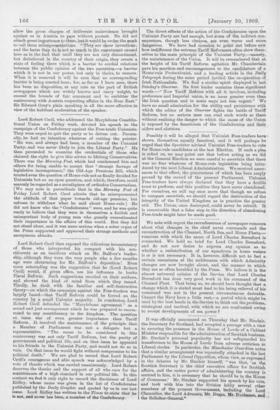Lord Robert Cecil, who addressed the Maiylebone Constitu- tional Union
on Friday week, devoted his speech to the campaign of the Confederacy against the Free-trade Unionists. They were urged to quit the party or be driven out. Person ally, he had no intention whatever of cutting the painter. "He. was, and always had been, a member of the Unionist Party, and was never likely to join the Liberal Party." He then proceeded to examine the credentials of those who claimed the right to give this advice to lifelong Conservatives. There was the Morning Post, which had condemned him and others for being unable to accept that "strange farrago of legislative incompetence," the Old-Age Pensions Bill, which treated even the question of Home-rule not as finally decided for Unionists but as an open question, and which, therefore, could sparcely be regarded as a meuthpiece of orthodox Conservatism. [We may note in parenthesis that in the Morning Post of Friday Lord Robert Cecil admits that he misrepresented the attitude of that paper towards old-age pensions, but refuses to withdraw what he said about Home-rule.] He did not know who the " Confederates " were, and he was quite ready to believe that they were in themselves a foolish and unimportant body of young men who greatly overestimated their importance in the affairs of this world. But they did not stand alone, and it was more serious when a sober organ of the Press supported and approved their strange methods and anonymous attacks.
























































 Previous page
Previous page